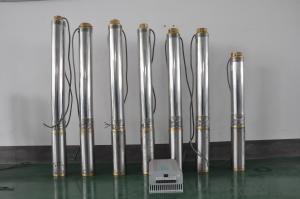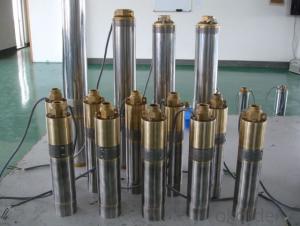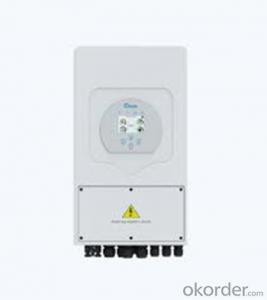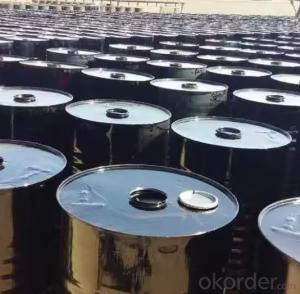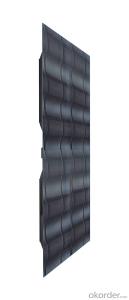Submersible Solar Water Pump
- Loading Port:
- China Main Port
- Payment Terms:
- TT OR LC
- Min Order Qty:
- -
- Supply Capability:
- -
OKorder Service Pledge
OKorder Financial Service
You Might Also Like
Item Description :
This superb new addition to our solar fountain range comes with a 10w solar panel,and a powerful fountain pump that is capable of producing fountains of up to 2m in height. As well as being easy to set up and use.Instruction manual is supplied for assembly and maintenance.
Solar Fountain Key Features :
Powered by direct sunlight
No high voltage electric mains required
Safe for children
Max. height of fountain: 2M
Max. flow capacity: 800 L/H(176 GAL)
10W Polycrystalline solar panel included
18V DC brushless pump
Solar Pump Features :
Can produce fountains up to : 2M (tube height) 1.4M (fountain height)
Comes with multiple nozzle accessories
Cable Length : 5M
Solar Panel Features :
10W peak power.
Polycrystalline highly efficient solar panel
Comes mounted in aluminium frame
Comes with ground stake and rotating knob so you can angle your panel toward the sun
What You Will Get :
10W solar panel
Solar pump
Ground Sake
Nozzle accessories
Precautions :
DO NOT alter or change the product itself or its components
Operate pump in freshwater only, never above 50 degrees celsius
Keep away from flammable liquids
Do not connect to any other power supply other than the included
- Q:How does a solar pump help in reducing the risk of water scarcity?
- A solar pump helps in reducing the risk of water scarcity by providing a sustainable and reliable source of water without relying on conventional electricity. It harnesses solar energy to power the pump, which eliminates the need for fossil fuels and reduces carbon emissions. This enables access to clean water in remote areas and reduces the strain on existing water resources, ultimately helping to address water scarcity challenges.
- Q:Can a solar pump be used for livestock cooling systems?
- Indeed, livestock cooling systems can utilize a solar pump. These pumps are specifically designed to function by harnessing solar energy, rendering them a sustainable and economically viable option for various purposes, including the cooling of livestock. Their capacity to circulate water through cooling systems aids in temperature regulation and provides relief for livestock during excessively hot weather conditions. By harnessing the immense power of the sun, solar pumps present an environmentally conscious alternative to conventional pumps, leading to reduced electricity expenses and a minimized carbon footprint. Furthermore, solar pumps are often low-maintenance and can be effortlessly installed in remote areas, making them a pragmatic choice for livestock cooling systems in rural regions.
- Q:How does a solar pump handle water source contamination from sewage leaks?
- A solar pump operates independently of water source contamination from sewage leaks as it draws water directly from a natural source like a well, river, or pond. It does not come into contact with the contaminated water, ensuring the safety and purity of the pumped water.
- Q:Can a solar pump be used for water supply in mining or construction sites?
- Yes, a solar pump can be used for water supply in mining or construction sites. Solar pumps are ideal for these applications as they can provide a reliable and sustainable water source without the need for electricity or fuel. They can operate remotely in areas with limited access to power grids and are capable of pumping water from deep wells or rivers to meet the water demands of mining or construction activities. Additionally, solar pumps are cost-effective and have low maintenance requirements, making them a practical choice for these sites.
- Q:Are there any limitations on the water conductivity or salinity for a solar pump?
- Yes, there are limitations on the water conductivity or salinity for a solar pump. High levels of water conductivity or salinity can adversely affect the performance and lifespan of a solar pump. Excessive conductivity or salinity can cause corrosion, mineral buildup, and damage to the pump components. It is therefore important to ensure that the water being pumped meets the recommended conductivity and salinity levels specified by the manufacturer to ensure optimal operation and longevity of the solar pump.
- Q:How does the cleanliness of the solar panels affect the performance of a solar pump system?
- The cleanliness of solar panels has a significant impact on the performance of a solar pump system. Solar panels are designed to convert sunlight into electricity, which powers the pump system. However, when the panels are dirty or covered with dust, leaves, bird droppings, or other debris, their efficiency decreases. Dirt and debris on the surface of solar panels obstruct the sunlight from reaching the photovoltaic cells, reducing their ability to generate electricity. This results in a decrease in the overall power output of the solar panels, which directly affects the performance of the pump system. The pump may not receive sufficient power to operate at its optimal levels, leading to reduced water flow or even complete failure of the system. Regular cleaning and maintenance of solar panels are essential to maintain their efficiency and performance. Cleaning the panels helps to remove dirt, dust, and other debris, allowing maximum sunlight to reach the photovoltaic cells. This ensures that the panels can generate the required electricity to power the pump system effectively. In areas with high levels of air pollution or dusty environments, the frequency of cleaning may need to be increased. Neglecting to clean the panels regularly can result in a significant decrease in the performance of the solar pump system, leading to operational inefficiencies and increased energy costs. In conclusion, the cleanliness of solar panels is directly related to the performance of a solar pump system. Regular cleaning and maintenance of the panels are crucial to ensure optimal power generation and efficient operation of the pump system. By keeping the panels clean, the system can operate at its full potential and provide consistent water flow for various applications.
- Q:What is the expected lifespan of the solar panels in a solar pump system?
- The lifespan of solar panels in a solar pump system can vary depending on several factors. On average, solar panels typically last between 25 to 30 years. However, if they are properly maintained and cared for, they can endure even longer. Various factors influence the durability of solar panels, including the quality of materials used, the manufacturing process, and the environmental conditions in which they are installed. Panels constructed with high-quality and durable materials tend to have a longer lifespan. To maximize the lifespan of solar panels, regular maintenance and cleaning are essential. Over time, dust, dirt, and debris can accumulate on the surface, reducing their efficiency. Periodically cleaning the panels and ensuring they are free from any shading or obstructions can help maintain their performance and extend their lifespan. Extreme weather conditions, such as hail, heavy snow, or strong winds, have the potential to damage solar panels. Nevertheless, modern solar panels are designed to withstand these conditions to some extent. Therefore, it is crucial to select panels with good weather resistance, especially if you reside in an area prone to severe weather events. In conclusion, the lifespan of solar panels in a solar pump system typically ranges from 25 to 30 years. However, with proper maintenance and care, their lifespan can be extended. Choosing high-quality panels, regularly cleaning them, and protecting them from extreme weather conditions are all essential for maximizing their longevity.
- Q:How do solar pumps handle water with low pH or chemical contamination?
- Solar pumps are not specifically designed to handle water with low pH or chemical contamination. However, in some cases, the use of solar pumps may help in mitigating the effects of low pH or chemical contamination. Solar pumps primarily work by utilizing solar energy to power the pumping mechanism, and they do not have specific filtration or treatment systems to address water quality issues. Therefore, if the water has low pH or chemical contamination, additional treatment or filtration methods may be required before using the water for desired purposes.
- Q:Can a solar pump be used for water supply in remote military bases?
- Yes, a solar pump can be used for water supply in remote military bases. Solar pumps are particularly well-suited for remote locations as they operate using solar energy, eliminating the need for a constant power supply or fuel. This makes them highly reliable and cost-effective for supplying water in areas where traditional power sources may not be readily available. Additionally, solar pumps can be easily installed and require minimal maintenance, making them a practical solution for remote military bases.
- Q:How does a solar pump help in reducing the use of chemical fertilizers?
- A solar pump helps in reducing the use of chemical fertilizers by providing a sustainable and environmentally friendly irrigation solution. By harnessing solar energy to power the pump, farmers can efficiently water their crops, leading to better nutrient absorption and healthier plants. This reduces the need for chemical fertilizers, as the optimal irrigation provided by the solar pump ensures that plants receive the right amount of water and nutrients naturally, promoting their growth and yield.
1. Manufacturer Overview |
|
|---|---|
| Location | |
| Year Established | |
| Annual Output Value | |
| Main Markets | |
| Company Certifications | |
2. Manufacturer Certificates |
|
|---|---|
| a) Certification Name | |
| Range | |
| Reference | |
| Validity Period | |
3. Manufacturer Capability |
|
|---|---|
| a)Trade Capacity | |
| Nearest Port | |
| Export Percentage | |
| No.of Employees in Trade Department | |
| Language Spoken: | |
| b)Factory Information | |
| Factory Size: | |
| No. of Production Lines | |
| Contract Manufacturing | |
| Product Price Range | |
Send your message to us
Submersible Solar Water Pump
- Loading Port:
- China Main Port
- Payment Terms:
- TT OR LC
- Min Order Qty:
- -
- Supply Capability:
- -
OKorder Service Pledge
OKorder Financial Service
Similar products
New products
Hot products
Hot Searches
Related keywords
